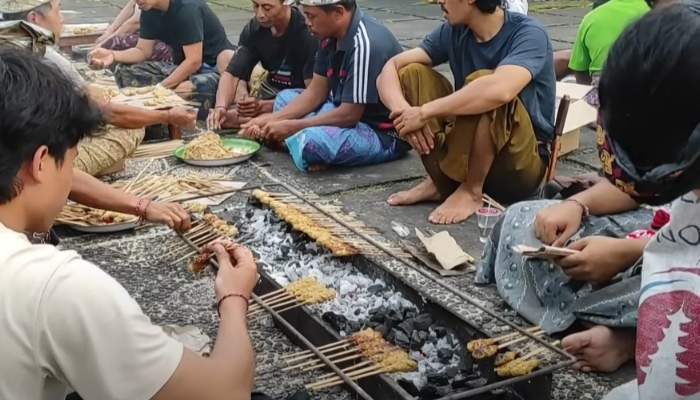If you live in Bali or often visit its traditional villages, you’ve probably heard of “mebat.” But for those who aren’t familiar, let’s talk about it together! Mebat isn’t just a group cooking session—it’s also a symbol of unity and the spirit of mutual cooperation that still thrives within Balinese society today.
What Is Mebat?
Simply put, mebat is a communal cooking activity held in preparation for traditional or religious ceremonies such as temple festivals (odalan), weddings, or cremations (ngaben). Usually, a large family or even an entire banjar (community group) will gather and work together to prepare large quantities of traditional Balinese dishes.
If you think about it, mebat is kind of like a “pre-party” before the main event. Everyone pitches in: from the elderly to the youth, from preparing ingredients to cooking together. And the best part? It’s all done with joy and without expecting anything in return.
Before Mebat Begins
Mebat usually starts very early in the morning. The courtyard or community hall turns into a temporary kitchen full of traditional cooking tools. The men come with knives, cutting boards, and slaughtering equipment. The women are busy with spices and vegetables. And the young folks? Sometimes they help, sometimes they’re busy updating their stories 😄.
Tasks are divided based on custom:
-
Adult men: handle meat, prepare satay lilit, and other physical tasks.
-
Women: grind spices, handle grated coconut, vegetables.
-
Youths: help here and there and sometimes act as go-betweens for kitchen teams.
Base Genep: The Magic Spice Mix of Balinese Cuisine
If you’ve ever tasted Balinese food, you know how flavorful the spices are. That’s all thanks to “base genep”—a traditional spice mix that serves as the base for many Balinese dishes. The ingredients are complete: shallots, ginger, turmeric, candlenuts, chilies, and more, all ground into a fine paste.
This paste is usually made by hand using a large mortar and pestle, as it’s believed to produce a more natural flavor than a blender. The process may be tiring, but the result is extraordinary.
Must-Have Dishes in the Mebat Tradition
The most mouthwatering part of mebat is, of course, the food. Here are some signature dishes that are almost always present during mebat:
-
Lawar
A mix of minced meat, grated coconut, and vegetables, seasoned with base genep. Sometimes fresh blood is added for a distinct taste. There are many kinds of lawar: red, white, and even jackfruit lawar. -
Sate Lilit
Spiced ground meat wrapped around lemongrass sticks and grilled. Its aroma is tempting, and the flavor is incredibly savory. -
Tum
Similar to pepes, tum is seasoned meat wrapped in banana leaves and steamed. Usually small in size but rich in flavor. -
Ayam Betutu
A whole chicken seasoned with a full array of spices, wrapped in leaves, and slow-cooked for hours. The aroma is distinct, and the texture is tender. -
Komoh
A traditional soup made with meat and a light, spice-rich broth. Usually served at important ceremonies.
The Atmosphere During Mebat
What makes mebat special is its lively atmosphere. People are busy but still manage to joke, laugh, and chat freely. The courtyard or community hall transforms into a warm and festive gathering place.
The younger generation can learn from the elders, and everyone feels like an important part of the event. There’s a sense of closeness that’s hard to find elsewhere.
Values Embedded in the Mebat Tradition
Behind the hustle and bustle of the makeshift kitchen lie many valuable principles, such as:
-
Teamwork: Everyone plays a role.
-
Togetherness: Mebat becomes a moment for family and neighbors to gather.
-
Cultural preservation: Recipes and cooking techniques are passed directly from elders to the younger generation.
-
Social care: Balinese people are used to helping without expecting a reward.
Mebat in Today’s Era
Even in a modern and fast-paced world, mebat still exists. While some people have started turning to catering services, this tradition remains the top choice for major events. In fact, more and more young people are becoming interested in participating and learning from the process.
Some even document mebat through videos and social media, turning it into educational content and a way to preserve the culture.
Want to Join a Mebat? Here Are Some Tips
If you’re interested in joining a mebat, here are a few tips to help you blend in smoothly:
-
Show good intentions. Ask what tasks you can help with.
-
Bring your own tools. For example, a knife or cooking equipment.
-
Dress modestly and comfortably.
-
Prepare your energy and leave some space in your stomach. The end of mebat usually means a festive communal feast!
Conclusion
The mebat tradition isn’t just about cooking together. More than that, it’s a way for Balinese people to maintain togetherness, show respect for their ancestors, and build strong social bonds. In a world that’s becoming busier and more individualistic, mebat is a reminder that simple things like cooking together can bring great joy.
If you ever get the chance to join a mebat, don’t hesitate. Who knows—it might become your most memorable experience in Bali.












